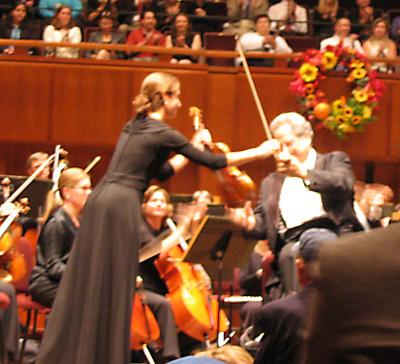The NSO's Opening Salvo
Itzhak Perlman |
 Vaughan Williams's Five Variants on "Dives and Lazarus" for string orchestra and harps is to folk song what his Fantasia on a Theme of Thomas Tallis is to, well, Tallis or the Fantasia on “Greensleeves” to Henry VIII. (He’s the composer of ‘Greensleeves’, even if he is more widely known for his drive to liberalize divorce laws on the scepter’d isle.) The work is not nearly so much less than its more famous cousins as that fame discrepancy would suggest. It also gave concertmaster Nurit Bar-Josef once more an opportunity to shine.
Vaughan Williams's Five Variants on "Dives and Lazarus" for string orchestra and harps is to folk song what his Fantasia on a Theme of Thomas Tallis is to, well, Tallis or the Fantasia on “Greensleeves” to Henry VIII. (He’s the composer of ‘Greensleeves’, even if he is more widely known for his drive to liberalize divorce laws on the scepter’d isle.) The work is not nearly so much less than its more famous cousins as that fame discrepancy would suggest. It also gave concertmaster Nurit Bar-Josef once more an opportunity to shine.Charles T. Downey, DCist Goes to the Symphony (DCist, September 22) Daniel Ginsberg, The NSO Delivers a Promising 'Prelude' (Washington Post, September 22) |
 Tchaikovsky’s 4th Symphony was the second half’s offering and the opening’s brass fanfare blared loudly into the Kennedy Center’s Concert Hall before it was mellowed by the woodwind’s segue into the strings getting their due. It’s of course a rightly popular work, and you’d think that concert halls and recordings would be flush with great performances. All the more surprising – to me at any rate – is how seldom I hear it pulled off with all the fire and nuance that make for a wholly thrilling account. It would be easy to say that Slatkin only truly excels in Anglophone music, but last season’s Rachmaninov 2nd and Mahler 9th proved that wrong, anyway. Nothing was amiss in this powerful fourth, either, but it left that intangible last bit that makes for a great performance unexplored. It may be a lame excuse for my inability to put it into words, but playing off a famous quote about pornography I admit that I can’t tell you where the exact line between dutiful performance and playing with complete abandon lies, but I can tell you when I hear either. Perhaps not so intangible was the brass’s performance that was akin to a high contrast photo, sharp at the edges and almost uncomfortably present. Voluminous, not crass, but neither with the warmth and soft hue that make the difference between a snapshot from the last vacation and an Henri Cartier-Bresson photograph. That’s all criticism from a vantage point of luxury, though – and I don’t think anyone was disappointed by the performance.
Tchaikovsky’s 4th Symphony was the second half’s offering and the opening’s brass fanfare blared loudly into the Kennedy Center’s Concert Hall before it was mellowed by the woodwind’s segue into the strings getting their due. It’s of course a rightly popular work, and you’d think that concert halls and recordings would be flush with great performances. All the more surprising – to me at any rate – is how seldom I hear it pulled off with all the fire and nuance that make for a wholly thrilling account. It would be easy to say that Slatkin only truly excels in Anglophone music, but last season’s Rachmaninov 2nd and Mahler 9th proved that wrong, anyway. Nothing was amiss in this powerful fourth, either, but it left that intangible last bit that makes for a great performance unexplored. It may be a lame excuse for my inability to put it into words, but playing off a famous quote about pornography I admit that I can’t tell you where the exact line between dutiful performance and playing with complete abandon lies, but I can tell you when I hear either. Perhaps not so intangible was the brass’s performance that was akin to a high contrast photo, sharp at the edges and almost uncomfortably present. Voluminous, not crass, but neither with the warmth and soft hue that make the difference between a snapshot from the last vacation and an Henri Cartier-Bresson photograph. That’s all criticism from a vantage point of luxury, though – and I don’t think anyone was disappointed by the performance.The pizzicato third movement is so dominant and, I think, unparalleled in kind and length, that it is surprising that the symphony shouldn’t have gotten a catchy nickname along those lines. Wouldn’t “Pizzicato Symphony” fit right between “Little Russian” and “Pathetique”? The crashing noise that opens the finale and jolts audience members out of their slumber was executed with such decibel-happy gusto that I could just imagine the boyish smirk on Maestro Slatkin’s face as his orchestra really dug into it. Con furioso indeed.
Repeat performances take place today at 7PM and on Friday at 1.30PM.





















































No comments:
Post a Comment